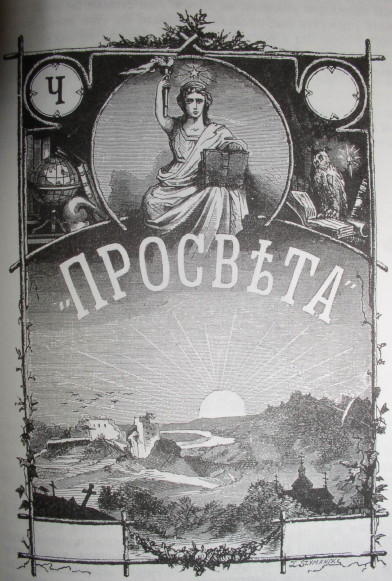Prosvita
Prosvita societies [Просвіта] (Enlightenment societies). Ukrainian community organizations active in Ukraine from the late 1860s to the 1940s and in other countries from the early 20th century. Prosvita societies were first established in Galicia and became most developed there. Initially they had a general educational purpose and incorporated only the intelligentsia, but over time they assumed a mass character and diversified into a number of areas of activity. In several instances they laid the groundwork for the establishment of economic co-operatives, educational societies, and other groups that were instrumental in the Ukrainian national movement. In central and eastern Ukraine the development of Prosvita societies was stymied by political hostility to the Ukrainian populist ideals that underpinned their work. Nevertheless, the small number of Prosvitas established after the Revolution of 1905 had a substantial impact on the development of Ukrainian national consciousness. The ground swell of support for the movement following the Revolution of 1917 indicated that the societies probably would have developed a mass character if they had not been suppressed by the Soviet regime early in the 1920s. In other parts of the Russian Empire Prosvita societies provided a key focal point for community activity. Prosvita societies also developed in Europe and the Americas, and although they were vital community institutions, they never assumed the same mass character as the Galician Prosvita.
Galicia. The first Prosvita society was founded in Lviv on 8 December 1868 by a group of young populists who were unhappy with the conservatism and increasing Russophilism of the Halytsko-Ruska Matytsia. The idea of the new society was proposed by Stepan Kachala. The first constitution defined Prosvita as a learned society, whose purpose was to ‘know and edify the people.’ Besides ‘promoting the moral, material, and political edification of the people’ it was to ‘collect and publish all the fruits of oral folk literature.’ The original membership (72) was limited to a small circle of the intelligentsia. In the new constitution of 1870 the society's mandate was narrowed down to that of ‘promoting education among the Ruthenian (Ukrainian) people’ by means of popular publications in the vernacular and the organization of county committees, which eventually developed into branches. Prosvita's research function was transferred to the Shevchenko Society, which in 1893 was reorganized into the Shevchenko Scientific Society. To increase membership, the constitution was amended in 1876: the admission fee was abolished, annual dues were reduced drastically, and all members received a free popular booklet each month. With these changes Prosvita started to become a truly popular organization. The first presidents of Prosvita were Anatol Vakhnianyn (1868–70), Yuliian Lavrivsky (1870–3), Volodyslav Fedorovych (1873–7), and Omelian Ohonovsky (1877–94).
Prosvita devoted considerable attention to the development of Ukrainian schools. It demanded from the government that Ukrainian schools be established and that Ukrainian be taught in the schools. It petitioned the government to establish a chair of Ukrainian history at Lviv University. It fought for equal rights for the Ukrainian language in the educational system. It published Ukrainian textbooks, not only for Galicia but also for Bukovyna and Hungary. In 1881 Prosvita's educational activities led to the establishment of the Ruthenian Pedagogical Society (later Ridna Shkola society).
The absence of local cells was Prosvita's major shortcoming in its early period. Outside Lviv educational work among the people was conducted by reading rooms, some of which were inspired or aided by the Prosvita society. In 1881–5 there were 320 reading rooms in Galicia under the care of Prosvita. They had no organizational ties among themselves, however, nor with the center in Lviv. Yet it was largely through Prosvita's initiative that the popular paper Bat’kivshchyna (1879) and the populist political organization the People's Council (1885) were established. The main rival to the avowedly Ukrainophile Prosvita was the Kachkovsky Society, a cultural-educational association established in 1874 by Galician Russophiles.
As more and more peasants joined the society, its structure was reshaped, and its goals were expanded. The revised constitution of 1891 provided for the establishment of autonomous rural reading societies tied to the central society in Lviv through county branches; a multitude of unconnected reading rooms would thereby be converted into a single network covering all of Galicia. Between 1891 and 1914 the number of reading rooms within Prosvita increased from 5 to 2,944, and the number of branches from 7 to 77, 3 of which (Sianik, Jasło, and Nowy Sącz) were in the Lemko region. In 1914, 75 percent of the cities, towns, and villages in Galicia had a reading room, and 20 percent of the province's Ukrainian population belonged to Prosvita (for growth in membership see the table).
At that time also the society assumed an activist posture and added the task of ‘raising the welfare of the Ukrainian people’ to its general educational purpose. Its new program called for the establishment of economic institutions, such as credit unions, stores, farm co-operatives, dairies, and warehouses, in association with reading rooms. The society became involved in improving farming methods, organizing agricultural courses, and publishing agronomic literature. From 1906 a special agricultural-industrial commission at the head office supervised its economic activities. By 1912 the Prosvita reading rooms had 540 stores, 339 small credit unions, and 121 warehouses. Its work in the area of economic life culminated with the First Educational-Economic Congress, held in February 1909 to commemorate the 40th anniversary of the society. As Ukrainian involvement in the economy expanded and became diversified, Prosvita transferred some of its economic functions to specialized central organizations, such as the Provincial Audit Union (later the Audit Union of Ukrainian Co-operatives), Maslosoiuz Provincial Dairy Union, and Silskyi Hospodar. It continued to play a role in economic education by maintaining itinerant farming instructors and publishing popular economic literature. It set up and financed a commercial school in Lviv, a women's domestic school in Uhertsi Vyniavski (1912–18), and a farming school in Myluvannia (1912–39) (photo: the Prosvita society agricultural school in Myluvannia). Furthermore, the society granted scholarships to students of agronomy, dairying, and domestic management and sent its best scholarship holders abroad to study (40 in 1907–14).
Prosvita's involvement in book publishing began in 1869, when it released Zoria (Star), a reader for peasants. Then similar readers and popular brochures about temperance brotherhoods, community banks, and warehouses began coming out, albeit irregularly. With the help of government grants the society published 17 textbooks for the lower Ukrainian gymnasium grades in 1871–6. From 1877 the society began printing monthly booklets, which members received free of charge. In a 50-year period (1868–1918) 348 popular booklets, including 305 monthly booklets (1877–1914), totaling 2,941,115 copies were published; of these, 88 were devoted to fiction, 52 to history and geography, 42 to economics and trade, 22 to science and medicine, 22 to legal issues, 11 to religion and military affairs, and 20 to biography. Another 41 were annual almanacs, and the remainder dealt with miscellaneous topics. The Ruska (later Ukrainska) pysmennist (Ruthenian [Ukrainian] Literature) series (1904–28) contained 28 volumes (over 170,000 copies) of Ukrainian classics. Eight books (23,000 copies) were issued in the Hospodarska biblioteka (Farming Library) series (1907–27). The Prosvitni lystky (Prosvita Leaflets) series consisted of 60 pamphlets (190,450 copies), mostly reprints of articles in Prosvita's almanacs and in Pys’mo z Prosvity. An additional 44 publications (183,606 copies) came out after 1909. The society published the educational and cultural magazines Pys’mo z Prosvity (1877–9, 1907–14) and Chytal’nia (1894–6). The editors of these various publications included Omelian Partytsky, Volodymyr Shashkevych, Yuliian Tselevych, Yurii Fedkovych, Ivan Franko, Anatol Vakhnianyn, Vasyl Lukych, Petro Ohonovsky, Kost Pankivsky, Kost Levytsky, Oleksander Borkovsky, V. Biletsky, Yarosalv Vesolovsky, Hnat Khotkevych, Yu. Balytsky, and Fed Fedortsiv. By 1914 over half the reading rooms had their own libraries, consisting largely of Prosvita's publications.
In the three-tiered structure of the Prosvita society the chief executive council in Lviv co-ordinated the work of the branches, which in turn assumed responsibility (from 1891) for the local reading rooms in their counties. The head office in Lviv, directed for many years by Andrii Skorodynsky and then by A. Hapiak, provided the branches with materials, organizers, examiners (particularly auditors), and lecturers. To manage the large organizational network, it relied on help from a number of commissions, particularly publishing, economic, and educational-organizational, which were formed in 1906–8. From 1869 the central Prosvita in Lviv maintained a library which received donations and book contributions, particularly from eastern Ukraine. In 1909, after transferring its most valuable collections to the Shevchenko Scientific Society, it was reorganized into a public lending library (16,900 volumes in 1935). An archive and museum set up at the Lviv Prosvita in 1869 was eventually donated to the Shevchenko Scientific Society and the National Museum. The central society organized a series of all-Ukrainian events, such as the Educational-Economic Congress in 1909 and the centennial of Taras Shevchenko's birth in 1914. From 1895 it owned its own building in the heart of the city. (Photo: Building of the Prosvita society in Lviv.)
Prosvita derived its income from membership dues (202,000 out of a total income of 793,000 kronen between 1868 and 1907), subsidies from the provincial and central governments, individual donations, and profits from its own operations, such as publishing. The subsidies from the Galician Diet were small and were often cut off because of Polish opposition. From 1908 they were increased, particularly to support the society's economic program. From 1870 to 1914 the Galician government donated 190,000 kronen to Prosvita for publishing and 173,000 kronen (1906–14) for economic operations. The Vienna government provided 42,000 kronen in 1906–9 for economic projects. Prosvita's first patron was its president, Volodyslav Fedorovych, who donated 24,000 kronen in 1875. Eventually a number of foundations for specific purposes were set up. Many of them provided scholarships for young people, among them the foundations of Rev Stepan Kachala, Count Mykhailo Tyshkevych, Rev S. Novosad (120,000 kronen for secondary-school scholarships), Rev I. Zalutsky, and S. Dubravsky. M. Maletsky left his estate in Uhertsi Vyniavski for a women's school. In 1869–1907 Prosvita's income totaled 793,000 kronen and its expenses, 791,000.
Until 1914 the Prosvita society was the most important Ukrainian mass organization in Galicia. Its activities, especially under the presidency of Ivan Kyveliuk (1910–22), encompassed almost all aspects of the nation's life, and it gave birth to various cultural, political, economic, farming, and sports societies and organizations which eventually became independent entities. Its reading rooms were the chief Ukrainian community organizations in the countryside and the focal points for the establishment of savings unions, co-operative stores, Silskyi Hospodar circles, and kindergartens. In short, Prosvita played a central role in the growth of national consciousness among the Ukrainian population and in the improvement of its standard of living: without its work the restoration of Ukrainian statehood in Galicia in 1918 would have been impossible. Prosvita also served as a model for the Ruska Besida in Bukovyna educational and cultural organization, the Prosvita society in the Dnieper region (est 1905), and the Prosvitas of the emigrants in the New World, with whom the Lviv-based society maintained contact.
The First World War inflicted heavy losses on the society: its buildings, equipment, and libraries suffered extensive damage, and most of its reading rooms were closed. Until 1921 the Polish authorities refused to allow them to be restored. Accordingly, in 1920 there were only 882 reading rooms in 73 branches. At the same time the society found itself in a financial crisis, as its holdings, which in 1914 were worth 352,000 kronen, had suffered from devaluation, and government subsidies had stopped altogether. It was only in 1924, when a new constitution was approved by the Polish authorities, that reading rooms began to be reopened on a wide scale. The Polish government continued to harbor reservations about Prosvita's work: during the Polish Pacification (1930) many Prosvita reading rooms were damaged or destroyed, and in 1936 one branch and 135 reading rooms were dissolved by the authorities. The society was also forbidden to expand its activities into the so-called northwestern lands (Volhynia, Podlachia, and the Kholm region). In the early 1930s its reading rooms in the western Lemko region were closed down.
In spite of government opposition the number of reading rooms increased steadily: by 1939 there were 3,075 reading rooms and 360,000 members in Prosvita (85 percent of Ukrainian settlements in Galicia had a reading room, and the membership incorporated 15 percent of the adult population). Almost 50 percent of the reading rooms owned their own premises. The highest percentage of the Ukrainian population enrolled in Prosvita was in Ternopil, Zbarazh, Skalat, and Sokal counties. In some villages there were also Young Prosvitas, which recruited young men and women. In the 1930s there were a lending library, a bookbinding shop, and a bookstore at the head office in Lviv.
The paragraph on economic activities was dropped from Prosvita's new constitution of 1924. Henceforth the society's work was restricted to the educational field, to which the presidents Mykhailo Halushchynsky (1923–31) and Ivan Bryk (1932–9) devoted most of their attention. Increasingly the work was carried out by full-time professional staff at the head office and at most of the branches, and even among groups of neighboring reading rooms. The policy on educational work was set by the Second Prosvita Congress in September 1929. Besides managing the usual affairs of the organization, in 1935–7 the head office organized 1,932 literacy courses, 112 courses for executive members of reading rooms, 37 courses for play directors, 26 courses for choir conductors, 8 courses for leaders of Young Prosvitas, and 11 general educational courses. In the second half of the 1930s the staff of the head office numbered several dozen. Vasyl Mudry, Stepan Shakh, and Mykola Duzhy were the key theoreticians and managers of educational work, besides the presidents, the secretaries, and the other members of the executive, such as Konstantyna Malytska. Branch inspectors and secretaries, such as Semen Magalias, Petro Petryk, M. Brylynsky, V. Haftkovych, and Mykhailo Kushnir, provided support for the head office.
Because of financial difficulties Prosvita did not publish in the same quantities as before the First World War, but its publications improved in content and design. Besides continuing the Ruska pys’mennist’ series, it published 8 books (31,500 copies) in the Zahalna biblioteka (General Library) series (1919–28), including Mykhailo Vozniak's Istoriia ukraïns’koï literatury (History of Ukrainian Literature, 3 vols, 1920–4) and Ukraïns’ki narodni dumy (Ukrainian Folk Dumas, 1920) under the editorship of Filaret Kolessa. By 1938, 22 works of popular scholarship, by such authors as M. Vozniak, Mykola Holubets, Volodymyr Doroshenko, F. Kolessa, Ivan Krypiakevych, Volodymyr Kubijovyč, Ivan A. Rakovsky, Stepan Rudnytsky, Stepan Siropolko, and Omelian Terletsky, had come out in the Uchitesia, braty moi (Learn, My Brothers) series. The Narodna biblioteka (Popular Library) series (1919–28), which replaced the monthly booklets, contained 38 books (203,000 copies), including calendars. Ten books (48,000 copies) came out in the Istorychna Biblioteka (Historical Library) series. Another 53 booklets (157,000 copies) came out, mostly reprints of articles in Zhyttia i znannia.
Prosvita published over 600 books (3,995,000 copies) during its lifetime: 477 books, booklets, and leaflets (3,479,000 copies) in 1869–1918; and 126 titles (516,000 copies) in 1919–28.
In the interwar era Prosvita's periodical publications included the renewed Pys’mo z Prosvity (1921–2), which was reorganized into a magazine for extramural education titled Narodnia prosvita (1923–7), the monthly Prosvita (1936–9), the popular Zhyttia i znannia (1927–39), and the specialized magazines Amators’kyi poradnyk (1925–7) and Bibliotechnyi poradnyk (1925–6). The editors of Prosvita books and magazines included Volodymyr Doroshenko, Fed Fedortsiv, Stepan Shakh, Vasyl Mudry, Omelian Terletsky, and Vasyl Simovych.
The number of reading-room libraries increased from 2,664 in 1914 to 3,209 (with 688,186 books) in 1936. To expand the holdings of local libraries Prosvita organized a system of book purchasing and distribution. In 1924 the head office introduced traveling libraries (49 by 1935), which served the poorest communities and particularly the villages without reading rooms. The branch offices conducted similar activities. The branch libraries were usually lending libraries and often included special collections on extramural education and amateur theater.
In the interwar period Prosvita depended on membership dues, profits from its publications and cultural events, and individual donations for its budget. A fund-raising drive known as Dar Prosviti (A Gift to Prosvita) was held in December of each year on the anniversary of the society's founding. Substantial financial aid also came from emigrants in the New World, who sometimes financed entire libraries or buildings to house reading rooms.
In spite of government interference the Galician Prosvita made some contribution to the cultural and educational life in the northwestern lands. It provided advice and supplied books to the reading rooms there. Prosvita's ties with emigrant communities were also strong.
With the Soviet occupation of Galicia in 1939, Prosvita's entire network was dismantled, and some of its libraries were destroyed. In the Lemko region and the Sian region, which were under the German occupation, hundreds of reading rooms sprang up, some of them as revivals of the societies which had been closed down by the Poles in the 1930s. When the Germans captured eastern Galicia in 1941, they permitted reading rooms to be revived but only under the auspices of officially recognized Ukrainian educational societies.
Central and eastern Ukraine. The success of the Galician Prosvita attracted wide interest among Ukrainian circles in central Ukraine. Activists and writers from this region of Ukraine, including Ivan Nechui-Levytsky, Sofiia Rusova, Khrystia Alchevska, Dmytro Doroshenko, Mykola V. Levytsky, and Borys Hrinchenko and Mariia Hrinchenko, enlisted as secret (anonymous) members of Prosvita, supported it financially, and sent their works for publication in its magazines and book series. It served as an example for the Vik publishing house, established in Kyiv in 1895, and the Philanthropic Society for Publishing Generally Useful and Inexpensive Books in Saint Petersburg in 1898.
The first educational societies, which were called Prosvita after the Galician reading rooms, arose only after the Revolution of 1905. First among them was the Prosvita formed on 8 October 1905 in Katerynoslav, which had a membership of 400, including Dmytro Yavornytsky, Vasyl Bidnov, Yevhen Vyrovy, Dmytro Doroshenko and Nataliia Doroshenko, P. Narizhny, S. Lypkivsky, H. Denysenko, and L. Bidnova. It established branches in Manuilivka, Diivka, Perepyna, Hupalivka, and a number of other villages. Its activities consisted of organizing reading rooms, arranging various celebrations, concerts, plays, lectures, and evenings, and selling subscriptions to Ukrainian papers, magazines, and books. In 1914 it was closed down for ‘promoting separatism,’ but it continued to operate as the Ukrainian branch of the Russian Scientific Society. The rural reading rooms survived until 1916.
A second Prosvita was founded in Odesa on 30 October 1905 by Ivan Lutsenko, Mykhailo Komarov, Ivan Lypa, Serhii Shelukhyn, Andrii Nikovsky, and Mykhailo Slabchenko. This unique club of Ukrainian intelligentsia organized lectures and discussions, literary-musical evenings every Saturday, and plays every Sunday. Through its efforts Oleksander Hrushevsky began to lecture in Ukrainian on Ukrainian history at the university in 1906, the paper Narodnia sprava appeared, and two popular books were published. The society maintained a library and reading room, bookstore, museum, and choir until the authorities closed it down in 1908.
In May 1906 a Prosvita society was founded in Kyiv by Borys Hrinchenko, Hryhorii Kovalenko, Mykola Lysenko, Fotii Krasytsky, Fedir Matushevsky, and Mykhailo Starytsky with the support of Lesia Ukrainka, Serhii Yefremov, and Volodymyr Durdukivsky. Since it was prohibited from establishing branches, the society limited its activities, such as lectures, public readings, concerts, and plays, to the city and its suburbs. Laying down broad plans for educational work and publishing and setting up special committees for different activities, the Kyiv society assumed a leading role among the Prosvitas. It gave particular weight to publishing and within five years printed 34 books (163,760 copies) for the common people. Its reading-room library contained over 10,000 volumes, mostly in Ukrainian studies. By 1909 its membership had reached 625, but in 1910 the authorities dissolved the society by administrative order.
From 1906 Prosvitas sprang up in other centers, including Kamianets-Podilskyi, Zhytomyr, Chernihiv, Mykolaiv, and Melitopol. In the Kuban Prosvitas appeared in Katerynodar, Temriuk, and Maikop. Prosvitas were organized also in Novocherkassk (Don region), Baku (Caucasia), and Vladivostok (Far East). The authorities withheld approval of Prosvitas in Poltava gubernia and Kharkiv gubernia. Prosvitas in other gubernias were rarely allowed to set up branches. All Prosvita societies were closed down in 1910–11. Although there were only about 40 short-lived Prosvitas, including branches, in eastern Ukraine, they made a significant contribution to the growth of national consciousness.
With the outbreak of the Revolution of 1917, Prosvitas sprang up spontaneously in Ukrainian towns and villages. By the summer of 1917 a dense network covered eastern Ukraine. The revived Kyiv Prosvita assumed the leading role in the movement, and on 20 September 1917 it convened the First All-Ukrainian Conference of Prosvitas, which set up the All-Ukrainian Association of Prosvitas and the Central Bureau for co-ordinating the activities of rural societies and county associations. Many Prosvitas arose in the Far East and the Kuban. Within a short time thousands of Prosvita societies were established, and almost every town and larger village in Ukraine had a reading room. In 1917–22 the reading rooms were centers of Ukrainian national life. The new Soviet regime viewed the Prosvitas as centers of Ukrainian national resistance. In July 1920 the Central Executive Committee of the Communist Party of Ukraine passed a resolution to take control of the Prosvitas and incorporate them into state structures. This measure proved unsuccessful, and the Prosvitas continued to expand their influence, with the number of societies growing in 1921 from approx 4,000 to 4,500 with a total membership of 400,000. In February 1922 a meeting of the Ukrainian gubernial departments decided to destroy the Prosvitas and initiated measures to force their closure. As a result only 573 Prosvita branches were still operational in 1923, and these were converted into ‘Soviet’ Prosvitas, village centers, or reading houses. The Prosvitas in the Kuban, the Far East, and throughout the Russian Soviet Federated Socialist Republic were abolished also. Of the Far East Prosvitas only the one in Harbin survived until 1945.
With the German occupation of Ukraine in 1941 Prosvitas began to appear, often at the initiative of the OUN expeditionary groups, but as the administration passed into the hands of the German civil authorities, they dissolved themselves to avoid repression or were suppressed. The Prosvita in Kharkiv, with the president Vasyl Dubrovsky, the vice-president Z. Sapitska, and such members as B. Porai-Koshyts, O. Popov, Dmytro Solovei, and F. Bulbenko, was registered officially as an organization for mutual aid, particularly for food supplies, but went far beyond these activities to become the focus of Ukrainian civic life in the city (1941–3). It organized an exhibition of documents and memorabilia of Soviet terror, titled ‘Away with Bolshevism.’
Northwestern Ukraine. At the beginning of the 20th century there were active Prosvitas in Siedlce, Hrubeshiv, and Kobyliaky (in Biała Podlaska county) and in the Kremenets region of Volhynia. In 1916–18, during the Austrian-German occupation of Volhynia, the Ukrainian popular educational movement began to expand there as a result of the presence of the Ukrainian Sich Riflemen and the Bluecoats and Graycoats divisions. The Prosvita established in Brest in 1918, headed by Vasyl Dmytriiuk and V. Krynytsky, organized about 100 reading rooms in the villages and towns of Polisia. It was closed down by the Polish authorities in 1919 and revived in 1923, but eventually most of its reading rooms were closed down, and the rest disintegrated.
In the Kholm region and Podlachia the Ridna Khata society served as a regional counterpart to Prosvita. It had almost 125 branches by the time it was banned (1930) by the Polish authorities. The Prosvita in Lutsk, established in 1918, had 134 branches by 1932, when it was banned. Its membership included I. Vlasovsky, Ye. Petrytsky (a longtime president), Volodymyr P. Ostrovsky, Olena Levchanivska, and Mykola Maslov. On its initiative two educational conferences were convened in Lutsk. They resolved to set up a Volhynian Prosvita, which would cover the entire region, but the Polish government did not give consent. The Lutsk Prosvita organized courses in Ukrainian studies and workshops on co-operative management. Other county Prosvitas maintained similar programs. The most active were in Kremenets, Rivne, Kovel, Dubno, Horokhiv, Volodymyr-Volynskyi, Ostroh, Kostopil, Liuboml, and Oleksandriia. From the late 1920s the Polish authorities systematically closed down Prosvita branch offices and reading rooms in Volhynia and Polisia, until all 600 had been removed. The Prosvitas in the northwestern lands tried to maintain close contacts with the Prosvita society in Lviv, and in 1932–3 they started to establish Ridna Khata societies in Volhynia. These were disbanded in 1937–9. In the summer and fall of 1941, after the German occupation of Volhynia, a string of Prosvitas sprang up. These too were soon banned.
Transcarpathia. Prosvita was formally constituted in Transcarpathia only in the interwar era. It had some antecedents. In 1896 the Greek Catholic Reading Room, based on the constitution of the Lviv Prosvita and closely associated with it, was founded by Rev O. Shtefan in Skotarske. It was the first of several semilegal reading rooms and circles established after 1900, in villages such as Velyki Veretsky, Holubyne, Lypcha, Rakhiv, Stroine, and Yasinia. Commonly they received Prosvita's publications from Lviv and distributed them in spite of restrictions and prohibitions by the Hungarian authorities.
Prosvita was formally established in Uzhhorod in 1920, and subsequently its network spread throughout Transcarpathia. By 1923 it had four branches in county centers and 82 reading rooms, 30 drama groups, and 12 choirs in towns and villages. In 1934 there were 10 branches (including Prešov and Bratislava), 230 reading rooms, 146 theater groups, 21 orchestras, 98 choirs, and 47 sports groups. The membership reached 15,337. By the time it was dissolved in 1939, the Transcarpathian Prosvita had published over 200 books and brochures, almanacs, and an annual collection for Carpatho-Ukrainian studies, Naukovyi zbirnyk (14 vols, 1922–38). In 1925 Prosvita, a scientific-literary and economic monthly, came out for a brief period. The central society in Uzhhorod maintained the Ruthenian Theater of the Prosvita Society, directed by Mykola Sadovsky and then Oleksander Zaharov, the Nova Stsena national theater (1934–9), directed by Yurii Sherehii, and the Ruthenian National Chorus, conducted by O. Prykhodko. The village choirs were usually conducted by Prykhodko's students, among whom were A. Mino, Yu. Paliukh, F. Povkhan, I. Tymkanych, and F. Shymanovsky. A. Kist taught courses in folk dancing, and Ivan Romanenko organized orchestras. The larger branches and reading rooms owned their own buildings. The head office in Uzhhorod (built in 1926) also housed an ethnographic museum, the offices of various organizations, an editing office, and a library of 10,000 volumes (based on Hiiador Strypsky's private collection). The leading figures were Yulii Brashchaiko and Mykhailo Brashchaiko, Rev Avhustyn Voloshyn, Rev Vasyl Hadzhega, Rev Viktor Zheltvai, Avhustyn Shtefan, P. Yatsko, Stepan Klochurak, and Rev K. Fedelesh. The Prešov branch was managed by Rev E. Biharii and Iryna Nevytska. Annual conferences took place in various parts of Transcarpathia. The largest of them was the all-Prosvita conference of 1937 in Uzhhorod, attended by over 12,000 participants. Prosvita's chief competitor was the Russophile Dukhnovych Society (est 1923). The Hungarian authorities banned Prosvita in 1939 and confiscated its property. Its archive and part of its library were destroyed, and the remainder of its assets (along with all the property of the head office, its branches, and reading rooms) was transferred to the Subcarpathian Scientific Society.
Europe. In 1919, after the downfall of Austria-Hungary, the Ukrainians in the Bačka and Srem regions (of Yugoslavia) founded the Ruthenian People's Enlightenment Society in Novi Sad. It had a number of branches and a broad program that included publishing. Its activities were banned by the Hungarians, who occupied Bačka in April 1941. In 1923 a Prosvita society was established in Zagreb on the model of the Lviv one. It had branches and representations in Slovenia, Bosnia, and Belgrade. It published an irregular bulletin that eventually became Vistnyk Ukraïns’koho tovarystva Prosvita v Zahrebi (1936–9) and maintained contacts with Prosvita in Lviv. After Croatia declared independence in 1941, the Zagreb Prosvita transferred its functions to the Ukrainian Representation, the only functioning Ukrainian organization there, which paid little attention to educational work. After 1944 neither organization could resume its work, under the communist regime.
The first Prosvita outside Ukraine's ethnographic territory was the society established in Cracow in 1894 as a reading room under the Lviv Prosvita. In 1923 it became a branch of the Lviv society. A Prosvita operated in Vienna from 1908 to 1918. During the First World War there were Prosvita societies in Ukrainian refugee camps and in some prisoner of war camps for soldiers of the Russian army in Germany and Austria. In Czechoslovakia the Ukrainian Labor Battalion in Brno had a Prosvita (1922–3), and the societies in Bratislava and Prešov were tied to the Prosvita in Uzhhorod.
In France Prosvita societies arose among emigrant workers and were organized along the lines of Galician reading rooms. In the interwar period such reading rooms functioned in Versailles, Lyon, Metz, Orléans, Strasbourg, and Soissons. In 1932 there were 75 Prosvitas registered with the Ukrainian National Union in France.
North and South America. Popular educational societies modeled on the Lviv Prosvita were established among the Ukrainian emigrants in the New World. Eventually most of them were incorporated into various organizations, although their programs and activities were obviously influenced by the Lviv society. Separate Prosvita societies developed only in Argentina, Paraguay, Uruguay, and several Canadian centers.
The first Prosvita society in the United States was established in Shenandoah, Pennsylvania, in 1887. Other communities followed suit and also formed popular educational societies. From 1896 Rev Antin Bonchevsky led a campaign to develop a Prosvita-like association in the United States. The idea was pursued seriously by a group of Ukrainophile priests known as the American Circle after Bonchevsky's death in 1903, when they established a Prosvita-style press (Slovo) using moneys the priest had left in his will for this purpose. The venture folded in 1906 because of a lack of support, but it was revived under a different name for one more year. In 1909 the idea of an American Prosvita society was discussed at the All-People's Enlightenment Conference, held in Philadelphia. With the powerful backing of Bishop Soter Ortynsky the gathering launched an American Prosvita. The new group had an auspicious beginning, but it was scuttled in the heated dispute that broke out between Ortynsky and the Ukrainian National Association (UNA) in 1910. The UNA launched its own attempt at a Prosvita-style organization in 1912, when it formed the Enlightenment Committee. This group also enjoyed some initial success but failed to develop a Prosvita structure. Some UNA locals maintained the Prosvita name, and the general aims of Prosvita were pursued independently by various Ukrainian-American associations, but the society itself never took root. In the interwar period the Lviv Prosvita maintained contacts with Ukrainians in the United States and published three issues of Amerykans’kyi prosvitianyn to recruit members from among them.
Even though a large number of popular educational associations developed among Ukrainians in Canada along Prosvita lines, the society itself failed to take root there also. The first Ukrainian-Canadian reading society was established in Winnipeg, in 1899, and by the early 1920s such societies were widespread throughout the country. In the period after the First World War many of them were housed in community centers, which commonly referred to themselves as people's homes (narodni domy). These groups usually developed formal or informal ties with the national religious or ideological structures which were established in Canada in the 1920s and 1930s, and were not organized into Prosvita affiliates. Nevertheless, they functioned much as Prosvita societies, and 35 of the 116 educational societies in Canada in 1935 referred to themselves as Prosvitas. The most significant Ukrainian educational societies which were organized as Prosvitas were located in Winnipeg and Port Arthur–Fort William (Thunder Bay), and the people's homes in Edmonton and Toronto operated much along the lines of Prosvitas. An attempt was made (under the auspices of the Ukrainian Self-Reliance League) to establish a Union of Ukrainian Community Centres of Canada that would have served many of the functions of a central Prosvita organization, but the group failed to develop as anticipated.
The first Prosvita society in South America arose in Curitiba, Brazil, in 1902. Until 1914 educational organizations there bore various names, including Prosvita. After they merged into the Ukrainian Union in 1922 (later the Union for Agricultural Education), they ceased to act as independent societies.
In Argentina the first Prosvita society was founded in 1910 in Apóstoles. Others arose only in the 1920s. In 1924 the Ukrainian Central Prosvita Society was formed in Buenos Aires, and it became the head office for all the Prosvitas in Argentina. Before the Second World War branches were situated in Dock Sud, Valentin Alsina, Chaco, Tres Capones, and other centers. After the war the Prosvita society received a major influx of new members from among recent immigrants and was reoriented politically into a group supporting the OUN (Bandera faction). New branches were also formed in Lavallon, Vila Caraçca, San Martin, and other locations. In 1971 Prosvita had 15 branches and 1,226 members. Each branch had its own building, Ukrainian school, and secondary school. The society maintains a dance group and a banduryst kapelle and publishes Ukraïns’ke slovo (Buenos Aires) (since 1928), almanacs, and books.
In Paraguay educational societies began forming in the late 1920s and led to the establishment of a Prosvita society in Encarnación in 1937. By 1945 it had 10 branches. After the Second World War it developed a youth section, branches of which were later reconstituted as Ukrainian Youth Association groups. In the 1980s Prosvita in Paraguay maintained a central office in Encarnación and had five branches.
In Uruguay a Prosvita society was established in Montevideo in 1934 as a branch of the Buenos Aires Prosvita.
BIBLIOGRAPHY
Lozyns’kyi, M. Sorok lit diial’nosty ‘Pros’vity' (Lviv 1908)
Bryk, I.; Kotsiuba, M. (eds). Pershyi ukraïns’kyi prosvitno-ekonomichnyi kongres (Lviv 1910)
Shakh, S. Populiarna istoriia tovarystva ‘Prosvita’ u L’vovi (Lviv 1932)
Doroshenko, V. ‘Prosvita’: Ïï zasnuvannia i pratsia (Philadelphia 1959)
Pers’kyi, S.; Volynets’, S.; Gospodyn, A. Narys istoriï matirnoho tovarystva ‘Prosvity’ i ohliad prosvitnykh tovarystv u Kanadi (Winnipeg 1968)
Bohdan Kravtsiv, Mykhailo Borovsky, Vasyl Markus, Avhustyn Shtefan
[This article originally appeared in the Encyclopedia of Ukraine, vol. 4 (1993).]
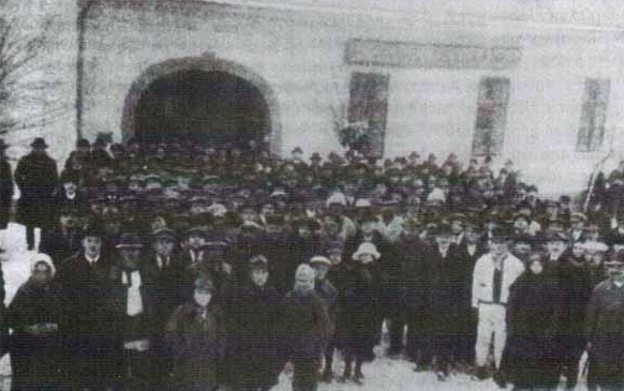
.jpg)
.jpg)
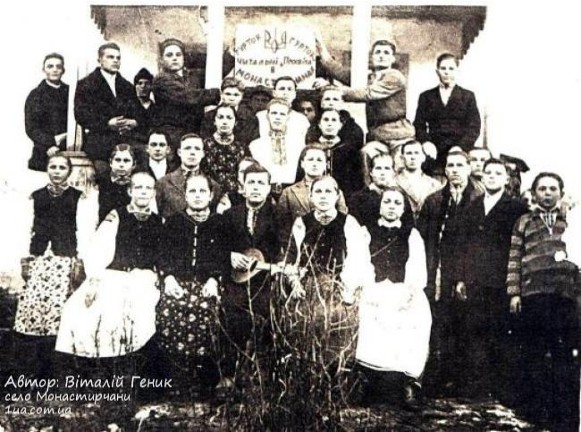
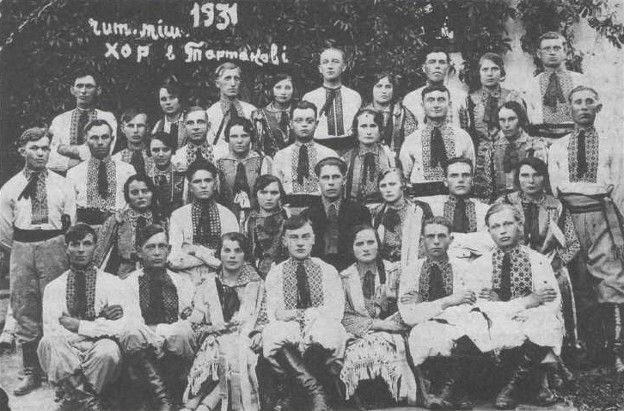
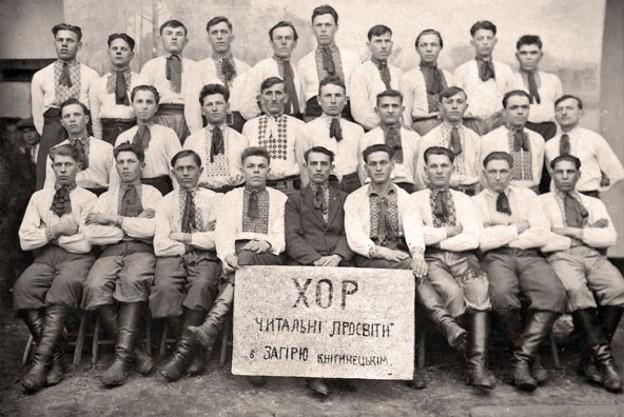
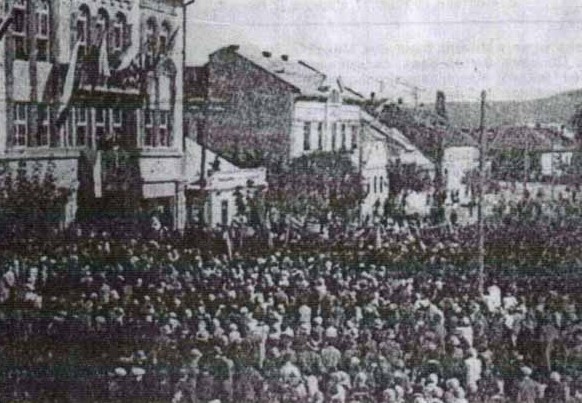
.jpg)
.jpg)
.jpg)
